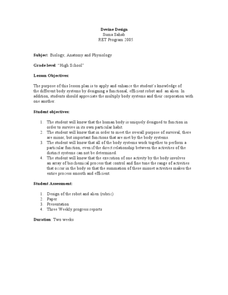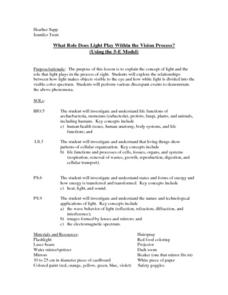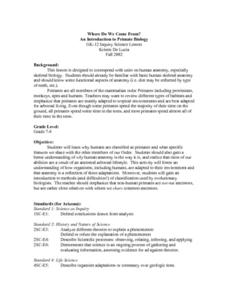Curated OER
Cellular Cellebrities
Sixth graders, in groups, learn the morphology and function of organelles within plant and animal cells.
Curated OER
Whose Parts Do I Have? (Wings and Things)
Learners identify an animal and a body part and then matches a body part to a specific animal. This will assess their ability to sort organisms and objects into groups according to their parts and describe how the groups are formed and...
Curated OER
Making a Model Lung
Students explain the parts of the body that are involved in breathing and explore lung function. In this model lung lesson students make a model of a lung then interpret and explain it.
Curated OER
WHAT IS A CELL?
Students explore the function and structures of cells, including plant and animal cells. They explore cell parts including cell wall, ribosomes, chromosomes, nucleoid, plasmids, flagella, pilli, and plasma membrane, cel
Curated OER
Explore! Fun with Science
Pupils explore the challenges of living in space by designing a facility that can provide everything required to support humans and can protect them from the harsh environment of space.
Curated OER
Feedback and Flowcharts
Sixth graders explain what a negative feedback system is and they distinguish it from a positive feedback system. They describe examples of how negative feedback is used in both nature and technology. , Students define homeostasis, and...
Curated OER
Devine Design
Pupils examine the functions of the different systems in the body. They discover how different systems must work together to make the body function correctly. They identify the needs of the body to help it survive.
Curated OER
Anatomy
Second graders identify the major organs of the body and their primary function, identify major systems of the body, and describe behaviors that protect the body structure and organs.
Curated OER
The Journey of a Red Blood Cell
Fifth graders examine how a red blood cell travels throughout the body. Using a model, they follow the flow of blood throughout the entire body. They identify the functions of the lungs and discuss the difference of the blood entering...
Curated OER
Lab Experiments in Nutrition
Looking for authentic hands-on nutritional experiments? High schoolers will perform experiments to test for the presence of vitamin C in several solutions as well as the effect of caffeine on Daphnia. They will also consider the...
Curated OER
Water and Ice
Young scholars explore the forms of water. In this physics lesson, students use ice cubes and observe what happens when the ice melts. Young scholars freeze the water again and record observations.
Curated OER
Heart Beating Exercise
Students examine video clips and websites that explore the heart. They find and take their pulse while at rest and after exercising. They discuss foods which are good and bad for heart health.
Curated OER
The Allergy Chronicles
Students discuss their preconceived ideas about allergic reactions. They assume the role of health writers preparing a special section for the school newspaper on allergies. They research information about allergies and discuss their...
Curated OER
Our Lifeline Pump
Fourth graders, in groups, the exterior and interior of the human heart.
Curated OER
Zebra, Zebra Where Are Your Stripes?
Students observe the embryological development in the zebrafish. Developmental hierarchy from three germ layers is studied in depth. Research is validated on the body plan of the embryo.
Virginia Department of Education
The Germ Theory and Koch’s Postulates
Explore the history of cholera and its effect on society with your biology class. Young biologists will then proceed to grow their own germs, prepared from live cultures, and follow the steps of the scientific method to generate data....
Curated OER
What Role Does Light Play Within the Vision Process?
Pupils are introduced to the relationship between light and vision. In groups, they participate in experiments to discover how different wavelengths are divided in the visible spectrum. They record their answers and discuss their...
Curated OER
Where Do We Come From? An Introduction to Primate Biology
Seventh graders explore skeletal biology. Through a discussion and video observation, 7th graders investigate how the anatomy is adapted to the environment. Students study primates and explore their characteristics and behaviors.
MOST
What Are Cells?
What's in a cell, anyway? Kids read informational text on what makes up both animal and plant cells, including a page of vocabulary terms they will need to be familiar with (cytoplasm, ribosomes, vacuoles, etc.). Full-color images...
Curated OER
F.L.A.S.H. Introduction
F.L.A.S.H stands for Family Life and Sexual Health, it's a program specifically focused on providing special needs learners with vital information regarding personal and sexual health. This is an overview of the program, complete with...
Curated OER
Listening Devices
Learners design and construct a listening device that will allow them to listen to the sound generated by specific object inside a box.
Curated OER
Living Environment 2006
In this chemistry worksheet, learners answer 41 multiple choice question and 28 short answer questions to prepare for Living Environment Regents Exam.
Teach Engineering
Mechanics of Elastic Solids
Make the connection between Hooke's law and elasticity with an activity that introduces the class to the behavior of elastic materials. The resource defines stress and strain to calculate the modules of elasticity of...
Curated OER
Nutrition -- A Lesson for Life - Biology Teaching Thesis
Students briefly explain the importance of nutrition in their everyday lives, and they tell you about how many calories they should consume in a day. They list readily available and affordable healthy foods that they LIKE to eat....























